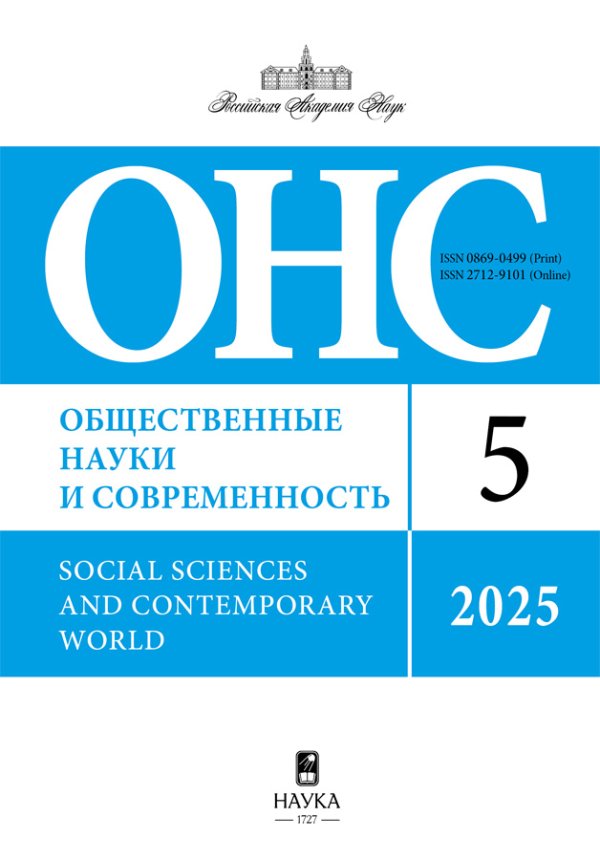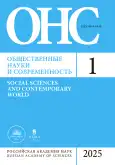Russian Civilization Facing the Challenges of Modernity...: Problems of Self-identification in Socio-Political Discourse
- Authors: Litvinova T.N.1
-
Affiliations:
- Moscow State Institute of International Relations
- Issue: No 1 (2025)
- Pages: 81-95
- Section: Civilizations and Society
- URL: https://journal-vniispk.ru/0869-0499/article/view/294889
- DOI: https://doi.org/10.31857/S0869049925010063
- EDN: https://elibrary.ru/BIEHPV
- ID: 294889
Cite item
Abstract
The problems of self-identification of the Russian civilization in socio-political discourse in the context of external challenges are studied. The views of foreign and domestic philosophers on the concept of «Russian civilization» are analyzed. Based on the methodology of critical discourse analysis by T.A. van Dijk, the connections between the concepts of «Russian civilization», «Russian idea», «Russian world», their polysemy, contexts of use and intention (goal, intentions) in the political process are revealed. The study showed that the main motive for using the concept of «Russian civilization» is associated with the isolation of the latter from Europe, while the concepts of «Russian idea» and «Russian world» sometimes act as synonyms, although contextually and intentionally they are not identical. A content analysis of the Russian Federation foreign policy concepts of 2013, 2016 and 2023 was conducted, and the evolution of ideas about the civilizational approach and priorities of Russia in strategic planning documents was traced. The phrase «state-civilization» included in the Russian Foreign Policy Concept of 2023 is identified with the «Russian world» and acquires a strategic significance that goes beyond the civilizational approach.
Full Text
About the authors
Tatiana N. Litvinova
Moscow State Institute of International Relations
Author for correspondence.
Email: tantin@mail.ru
ORCID iD: 0000-0002-5382-3751
Doctor of Sciences (Political Sciences), Associate Professor, Professor of the Department of State Regulation
Russian Federation, 76, Vernadsky Ave., Moscow, 119454References
- Berdyaev N.A. (2008) Russkaya ideya [Russian idea]. Saint Petersburg: Azbuka-classika. 320 p. (In Russ.)
- Vernadsky G.V. Nachertanie russkoi istorii. [Outline of Russian history]. Saint Petersburg: Lan, 2000. 318 p. (In Russ.)
- Danilevskiy N.Ya. (2002) Rossiya i Evropa. [Russia and Europe]. Moscow: Drevneye i sovremennoye. 548 p. (In Russ.)
- Gumilev L.N. (2001) Ot Rusi k Rossii: Ocherki ehtnicheskoi istorii [From Rus to Russia: Essays on Ethnic History]. Moscow: Rolf. 320 p. (In Russ.)
- Dugin A.G. (2002) Ehvolyutsiya natsional’noi idei Rusi (Rossii) [Evolution of the national idea of Rus (Russia)]. Otechestvennye zapiski, no. 3, pp. 125–140. (In Russ.)
- Dugin A.G. (2012) Geopolitika Rossii [Geopolitics of Russia]. Moscow: Academic Project; Gaudeamus. 424 p. (In Russ.)
- Ilyin I.A. (2008) Nashi zadachi [Our tasks]. Moscow: Ice-Press. Vol. 1. 224 p. (In Russ.)
- Ilyin M.V., Pakhalyuk K.A., Fomin I.V. (2019) Discourse Analysis. In: Sovremennaya politicheskaya nauka: Metodologiya [Modern Political Science: Methodology]. Ed.: O.V. Gaman-Golutvina, A.I. Nikitin. Moscow: Aspect Press. Pp. 464–483. (In Russ.)
- Irkhin Yu.V. (2014) Discourse Analysis: Essence, Approaches, Methodology, Design. Social and Humanitarian Knowledge, no. 4, pp. 128–143. (In Russ.)
- Rusakova O.F. (2007) Basic Theoretical and Methodological Approaches to Discourse Interpretation. Antinomies, no. 7, pp. 5–34. (In Russ.)
- Savitskiy P.N. (1997) Kontinent Evraziya [The Continent of Eurasia]. Moscow: Agraf. 464 p. (In Russ.)
- Soloviev V.S. (1989) Russkaya ideya [Russian Idea]. In: Soloviev V.S. Works: in 2 volumes. Vol. 2. Moscow: Pravda. 738 p. (In Russ.)
- Surkov V.Yu. (2008) Russkaya politicheskaya kul’tura. Vzglyad iz utopii. [Russian Political Culture. A View from Utopia]. Vestnik Rossiiskoi natsii, no. 1. pp. 92–109. (In Russ.)
- Tishkov V.A. (2018) Russkiy mir: istoriya i geografiya [The Russian World: History and Geography. In: Russkiy mir v menyayushchemsya mire [The Russian World in a Changing World]. Ed.: G.A. Komarova. Moscow: IEA RAS. Pp. 13–34. (In Russ.)
- Toinbi A.Dzh. (2010) Postizhenie istorii [Understanding History]. Moscow: Airis Press. 640 p. (In Russ.)
- Trenin D.V. (2022) Kto my, gde my, za chto my – i pochemu [Who We Are, Where We Are, What We Are for – and Why]. Russia in Global Affairs, vol. 20, no. 3, pp. 32–42. https://doi.org/10.31278/1810-6439-2022-20-3-32-42 (In Russ.)
- Trubetskoi N.S. (2014) Obshcheevraziiskii natsionalizm [Pan-Eurasian Nationalism. Russkoe zarubezh’e: Istoriya i sovremennost’, iss. 3, pp. 198–206. (In Russ.)
- Habermas J. (2001) Moral’noe soznanie i kommunikativnoe deistvie [Moral Consciousness and Communicative Action]. Saint Petersburg: Nauka. 382 p. (In Russ.)
- Huntington S. (2003) Stolknovenie tsivilizatsii i pereustroistvo mirovogo poryadka [The Clash of Civilizations and the Remaking of World Order]. Moscow: AST Publishing House. 603 p. (In Russ.)
- Spengler O. (2010) Zakat Zapadnogo mira [The Decline of the Western World]. Moscow: Alpha Book. 1085 p. (In Russ.)
- Suslov M. (2018) “Russian World” Concept: Post-Soviet Geopolitical Ideology and the Logic of “Spheres of Influence”. Geopolitics, vol. 23, iss. 2, pp. 330–353. https://doi.org/10.1080/14650045.2017.1407921
- Van Dijk T.A. (2005) Critical discourse analysis. In: The Handbook of Discourse Analysis. Ed.: D. Schiffrin, D. Tannen, H. Hamilton. Malden, Massachusetts, USA: Blackwell Publishers Ltd. Pp. 352–371.
- Van Dijk T.A. (1997) What is Political Discourse Analysis? Belgian Journal of Linguistics, vol. 11, iss. 1, pp. 11–52.
Supplementary files










